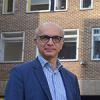“When I started, I had no expectation that the first year would be a very unusual year on every possible ground,” says Professor Leonardo Felli. He took over as Chair of the Faculty of Economics last year, and says he hopes to prepare the Faculty for upcoming challenges, including post-COVID funding cuts and Brexit, and to address long-term issues, such as what he describes as ‘US poaching’ of academic staff.
However, it is the Covid-19 pandemic which has been the most immediate issue he has had to deal with. Professor Felli says that “so far the indication is that online lectures have been well received”. In particular he has found that students appreciate being able to watch lectures at a more convenient time and being able to re-watch content. He emphasises that as with many organisations in the UK and worldwide facing the same issues, it is still a learning process and decisions, such as the right streaming platform, are still being debated at the University.
He joined the Faculty from the University of Edinburgh, having spent the previously 27 years at the London School of Economics (LSE). He was Head of Department for three years at the LSE and for one at the University of Edinburgh.
Social distancing restrictions have restricted the number of staff and PhD students allowed in the Faculty at one time. Now, Professor Felli has been keeping a close eye on how the faculty has dealt with the second lockdown in the England, which started at the beginning of November. “The Faculty has been trying very hard to keep reading groups and meetings running online,” he says, in order to protect the academic environment. However, he has found it has been particularly difficult for PhD students who have lost the opportunity to pop into offices for short research discussions.
The Faculty is currently contingency planning for Easter term. He comments, “We don’t want to just ignore the situation and be in the same situation as we were last year.”
Covid-19 also presents long-term challenges for the Faculty. Professor Felli notes “the type of funding is going to go down, although whether this will specifically affect Cambridge is uncertain.”
This compounds problems generated by Brexit. In December, the UK will officially leave the EU and will lose ERC funding. He says that, “the UK university system relies on ERC funding very heavily.” EU students will also become high fee students, which will likely decrease the number of applications and change the student composition. He hopes to partially overcome these problems through building a European network and increasing PhD funding.
The Faculty is currently working to create a European network, partnering with LMU Munich and CEMFI in Madrid. In the first stage, PhD students will be able to move between institutions. He hopes that this will make the Faculty more attractive to PhD students, allow good European PhD students to move to Cambridge and, potentially, open the door to European funding.
The Faculty is also looking at increasing PhD funding from internal sources. He says that, “PhD funding is critical as it will relax at least some of the constraints for Home/EU students.”
Professor Felli also aims to address pre-existing issues, such as so called ‘US poaching’; where academic staff in the Faculty of Economics are actively recruited by institutions in North America. The Faculty has lost a number of staff to LSE, Yale and other top institutions in recent years.
He says “convincing them to stay is critical and is getting more challenging. US Universities are extremely aggressive in their offers and it is difficult for Cambridge to compete.” One remedy is fast promotion, which Professor Felli notes has had some success at LSE.
A generous gift from Bill and Weslie Janeway will also allow the faculty to push the boundaries of teaching and research as a world leading centre in economics. He hopes that the appointment of the Janeaway Chair and the Ramsey Chair will also help staff retention.
The Faculty is now considering a number of initiatives, including changing hiring, promotion and admissions policies, to help achieve its diversity targets. This follows the Faculty receiving last year an Athena Swan Bronze Award for its efforts in improving equality and diversity.
“There has been a big effort in the Faculty to change the environment to make it more inclusive,” says Professor Felli. The Faculty is considering introducing promotional support and shortlist targets, similar to LSE, to improve staff diversity. He says that there are still unanswered questions, including the reasons for undergraduate and postgraduate demographic differences, and the Faculty must prioritise investigating these.
The Faculty is also considering creating an MPhil in Economics and Data Science, as part of a drive to increase interdisciplinary research. Professor Felli comments, “There is a big demand for such a course for obvious reasons. The growth of certain industries means that there is a big demand in terms of employment. Cambridge also has a very strong comparative position.” The Faculty would follow other universities, including MIT, Caltech and Yale, in introducing such a course.
The Faculty is currently in conversation with the History department regarding a joint appointment. Professor Felli hopes that this will tackle isolation problem and will fill the gap left by the recent exit of key group members.
During his tenure he hopes to build a Faculty that is resilient to challenges and to improve diversity in both research output and Faculty demographics.
Despite multiple issues caused by Covid-19 and Brexit, Professor Felli remains cautiously optimistic about the future for the faculty, and its engagement with the wider world, saying there are many initiatives to raise the faculties impact, and “the faculty is certainly moving in the right direction.”
By Rebecca Heath






